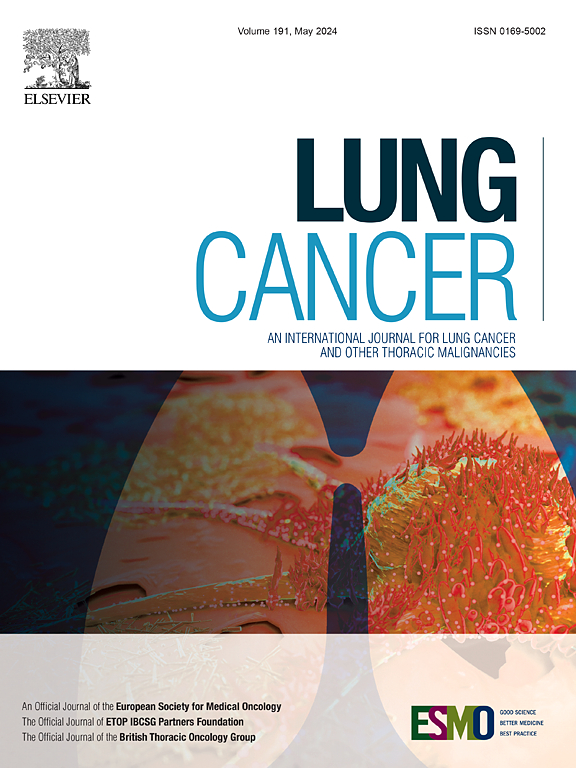晚期非小细胞肺癌的生物标志物景观:来自国家前瞻性登记的见解
IF 4.4
2区 医学
Q1 ONCOLOGY
引用次数: 0
摘要
目的肺癌患者可操作基因的测定是正确护理的必要条件。西班牙肺癌组(Fundación GECP)对这方面进行了探索性分析,特别是在IV期非小细胞肺癌(NSCLC)中。材料和方法胸腔肿瘤登记(TTR)是一项西班牙前瞻性、观察性队列研究。在数据提取时(2024年3月),来自82家医院的27,399名患者入组。结果共13583例IV期NSCLC患者。85.7%的非鳞状瘤患者和62.8%的鳞状瘤患者进行了至少一种肿瘤标志物的分析(p值<;0.001),自治区之间存在差异。在非鳞状人群中,三个最常分析的标记是EGFR (77.3%), ALK(66.1%)和PD-L1(56.3%)。近年来,生物标志物谱分析在鳞状组织中得到了更广泛的发展。没有普遍批准的靶向治疗的分子测定也有所增加。与ECOG PS <相比,ECOG PS 2患者的生物标志物检测较低;2 (77.6% vs 82.6%, p值<;0.001)。次级分析显示,比率也因医院规模而异。结论在西班牙,尽管缺乏国家计划,但IV期NSCLC患者的肿瘤标志物分析仍在继续增加,与欧洲和美国的水平相同。有临床指导的决定,是罕见的鳞状组织学,但有相当比例的阳性。即使在ECOG PS2患者中,也应考虑临床高度怀疑的生物标志物检测。临床试验注册号nct02941458。本文章由计算机程序翻译,如有差异,请以英文原文为准。
Biomarker landscape in advanced NSCLC: insights from a national prospective registry
Objectives
The determination of actionable genes is a necessity in lung cancer for proper care practice. The Spanish Lung Cancer Group (Fundación GECP) has performed an exploratory analysis of this aspect, specifically in stage IV non-small cell lung cancer (NSCLC).
Materials and methods
The Thoracic Tumor Registry (TTR) is a Spanish prospective, observational cohort study. At the time of data extraction (March 2024), 27,399 patients were enrolled from 82 hospitals.
Results
There were 13,583 patients with stage IV NSCLC. The analysis of at least one tumor marker was performed in 85.7 % of non-squamous and 62.8 % of squamous patients (p-value < 0.001), with differences between autonomous communities. In the non-squamous population, the three most frequently analysed markers were EGFR (77.3 %), ALK (66.1 %) and PD-L1 (56.3 %). Biomarker profiling has undergone a more pronounced and extensive development in squamous histology in recent years. Molecular determinations that do not have a generally approved targeted therapy have also increased. Biomarker testing in patients with ECOG PS 2 is lower compared to ECOG PS < 2 (77.6 % vs 82.6 %, p-value < 0.001). Sub-analysis shows rates also vary by hospital size.
Conclusion
The analysis of tumor markers in stage IV NSCLC patients continues to increase in Spain, at the same level as in Europe o USA, despite the absence of national plans. There are clinically guided determinations that are rare in squamous histology but have an appreciable percentage of positivity. Even in patients with ECOG PS2, biomarker testing with high clinical suspicion should be considered.
Clinical Trial Registration
NCT02941458.
求助全文
通过发布文献求助,成功后即可免费获取论文全文。
去求助
来源期刊

Lung Cancer
医学-呼吸系统
CiteScore
9.40
自引率
3.80%
发文量
407
审稿时长
25 days
期刊介绍:
Lung Cancer is an international publication covering the clinical, translational and basic science of malignancies of the lung and chest region.Original research articles, early reports, review articles, editorials and correspondence covering the prevention, epidemiology and etiology, basic biology, pathology, clinical assessment, surgery, chemotherapy, radiotherapy, combined treatment modalities, other treatment modalities and outcomes of lung cancer are welcome.
 求助内容:
求助内容: 应助结果提醒方式:
应助结果提醒方式:


